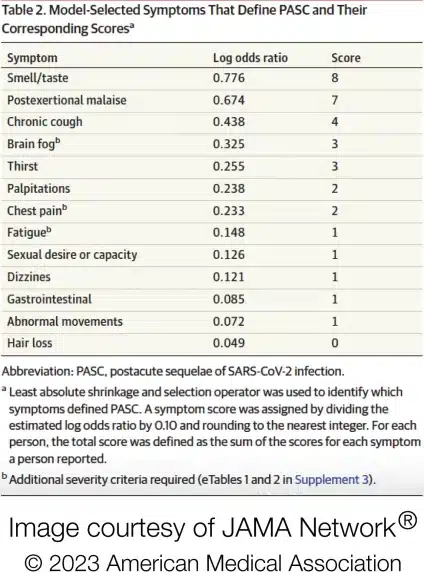Scientists who got some fancy federal funding have gone and proposed a definition for long Covid. They did this by looking at a whopping study published in the Journal of the American Medical Association.
Now, what’s this long Covid, you ask? Well, it’s when people experience all sorts of funky symptoms that just won’t quit, even months after they’ve had that pesky coronavirus.
You see, patients started calling it long Covid, but the smartypants scientists prefer the term “post-acute sequelae” or PASC for short. Fancy, huh? But here’s the thing, my friends, there’s still no agreed-upon definition for long Covid that everyone can use for research purposes. And that’s where this study comes in.

Dr. Leora Horwitz, a big-shot author of this study from NYU Grossman School of Medicine, says they’re aiming to come up with a solid, clear-cut definition for long Covid that anyone can use. They dug into the nitty-gritty details by examining almost 10,000 participants from 85 different hospitals, health centers, and community centers in 33 states, all thanks to that hefty $1.15 billion RECOVER research initiative funded by the National Institutes of Health.
Now, let’s talk symptoms, my friends. The ones that stood out the most in folks with long Covid were things like losing their sense of smell and taste (bummer!), feeling like they’re hit by a truck after even a little exertion, dealing with a pesky chronic cough, experiencing some serious brain fog, feeling as thirsty as a desert wanderer, having heart palpitations, chest pain, fatigue that just won’t quit, changes in their mojo, dizziness, tummy troubles, weird body movements, and even hair loss. Phew! That’s quite a list, right?
The scientists gave scores to each symptom based on how well they could distinguish folks with long Covid from those who managed to dodge the virus. If you hit 12 points or more, you’re likely stuck with long Covid, my friends.
But here’s the catch: this definition they’re proposing is still a work in progress. It needs some fine-tuning before it’s ready for prime time. You see, without a clear definition, many people with long Covid have struggled to get proper healthcare, especially early on when the pandemic was causing chaos. It’s tough to diagnose something when the symptoms can overlap with other conditions, you know?
And listen up, there’s no magical blood test that can pinpoint long Covid. Those sneaky scientists involved in RECOVER are on a mission to understand what’s going on inside our bodies that causes this condition. Maybe one day, they’ll crack the code and give us a test for it. Imagine that!
Dr. Horwitz says that this definition they’re cooking up could help doctors diagnose patients, kind of like they do with Lupus. You know, there’s no single blood test for that either. Doctors rely on a bunch of common symptoms to figure it out. So, maybe this definition will do the trick for long Covid too.
The goal, my friends, is to have a more systematic definition that researchers can use to answer all sorts of questions. Like, what are the risk factors? How likely is it to get long Covid after getting infected again? Does it vary between different versions of the virus? You get the idea.
Oh, and get this, they might use the biological samples from the patients in this study to dig deeper into what’s causing long Covid. Maybe they’ll find some treatments or help guide folks in future clinical trials. Exciting stuff, right?
One more tidbit before we wrap it up. The study found that long Covid was more common among those who got infected before that Omicron variant made its grand entrance in December 2021. About 35% of those pre-Omicron folks ended up with long Covid. Ouch! But if they got infected during the Omicron era, the odds dropped to 17%. And you know what? Fully vaccinated peeps had a lower chance of getting long Covid, no matter when they got infected. So, kudos to those who rolled up their sleeves for the shots!
Well, there you have it, folks. The scientists are working hard to figure out long Covid, but they’re not quite there yet. We’ll have to wait for them to polish up that definition and see what they uncover along the way. Stay tuned, stay healthy, and keep those thumbs up for progress!














